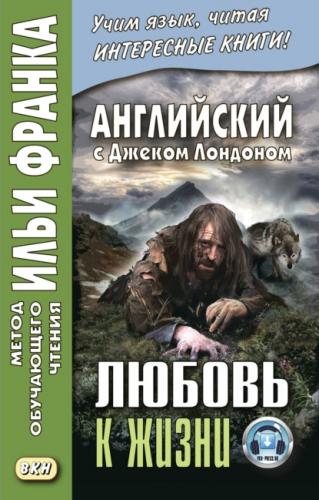with his mind (он так же упорно боролся со своим разумом)
, trying to think that Bill had not deserted him (стараясь думать, что Билл не бросил его;
to desert – покидать /территорию или человека/, оставлять; бросать /например, семью/)
, that Bill would surely wait for him at the cache (что Билл обязательно будет ждать его у тайника)
. He was compelled to think this thought (он был вынужден думать эту мысль = думать так)
, or else there would not be any use to strive (иначе не было никакого смысла бороться/стремиться)
, and he would have lain down and died (и он бы лег и умер)
. And as the dim ball of the sun sank slowly into the northwest (и когда неяркий шар солнца медленно опустился на северо-западе)
he covered every inch (он прошел каждый дюйм;
to cover – покрывать; охватывать)
– and many times (и много раз)
– of his and Bill’s flight south before the downcoming winter (своего бегства и /бегства/ Билла на юг перед надвигающейся зимой/от надвигающейся зимы;
flight – бегство, поспешное отступление; to come down – спускаться, опускаться; падать /о снеге, дожде/, спускаться /о тумане/; downcoming – падающий, нисходящий; downcome – сильный и внезапный снегопад, ливень)
. And he conned the grub of the cache and the grub of the Hudson Bay Company post over and over again (и он снова и снова перебирал /в памяти/ детально жратву тайника и жратву на посту компании «Гудзонов залив»;
to con – учить наизусть, зубрить; детально изучать что-либо; grub – /сленг/ жратва, жрачка, хавка; grub – личинка /особ. жука/; червь)
. He had not eaten for two days (он не ел уже два дня)
; for a far longer time he had not had all he wanted to eat (гораздо дольше он не ел всего того, что он хотел поесть)
. Often he stooped and picked pale muskeg berries (часто он нагибался и срывал бледные болотные ягоды)
, put them into his mouth (клал их в рот)
, and chewed and swallowed them (жевал и проглатывал их)
. A muskeg berry is a bit of seed enclosed in a bit of water (болотная ягода – это немножко семени, замкнутое в немножко =
в небольшом количестве воды)
. In the mouth the water melts away and the seed chews sharp and bitter (во рту вода тает, а семя жуется /и оказывается на вкус/ острым и горьким;
sharp – острый /о предмете/; едкий, острый /о вкусе/)
. The man knew there was no nourishment in the berries (человек знал, что в ягодах нет ничего питательного;
nourishment – кормление, питание; пища; еда, корм, поддержка; to nourish – кормить, питать)
, but he chewed them patiently with a hope greater than knowledge and defying experience (но он жевал их терпеливо с надеждой большей, чем знание, и бросая вызов опыту;
to defy – вызывать, бросать вызов; манкировать, игнорировать).
surely [‘ʃʋǝlɪ], chew [ʧu:], knowledge [‘nɒlɪʤ] These were the thoughts of the man as he strove onward. But hard as he strove with his body, he strove equally hard with his mind, trying to think that Bill had not deserted him, that Bill would surely wait for him at the cache. He was compelled to think this thought, or else there would not be any use to strive, and he would have lain down and died. And as the dim ball of the sun sank slowly into the northwest he covered every inch – and many times – of his and Bill’s flight south before the downcoming winter. And he conned the grub of the cache and the grub of the Hudson Bay Company post over and over again. He had not eaten for two days; for a far longer time he had not had all he wanted to eat. Often he stooped and picked pale muskeg berries, put them into his mouth, and chewed and swallowed them. A muskeg berry is a bit of seed enclosed in a bit of water. In the mouth the water melts away and the seed chews sharp and bitter. The man knew there was no nourishment in the berries, but he chewed them patiently with a hope greater than knowledge and defying experience.
At nine o’clock he stubbed his toe on a rocky ledge (в девять часов он ударился пальцем ноги о скалистый уступ; to stub – ударяться ногой обо что-либо твердое; stub – пень), and from sheer weariness and weakness staggered and fell (и от полнейшей усталости и слабости зашатался и упал; weary – усталый, изнуренный, утомленный; weak – слабый). He lay for some time (он полежал некоторое время), without movement, on his side (неподвижно: «без движения» на боку). Then he slipped out of the pack-straps and clumsily dragged himself into a sitting posture (затем он выскользнул из вьючных ремней и неповоротливо перетащил себя в сидячее положение; clumsy – неловкий; неповоротливый, нескладный). It was not yet dark (было еще не темно), and in the lingering twilight he groped about among the rocks for shreds of dry moss (и в затянувшихся сумерках он пошарил среди скал в поисках кусочков сухого мха; to linger – засиживаться, задерживаться; тянуться, затягиваться /о каких-либо действиях/). When he had gathered a heap he built a fire (когда он собрал кучу, он развел костер; to build – строить; разводить /о костре/), – a smouldering, smudgy fire (тлеющий, дымящий костер; smudgy – грязный, чумазый;
